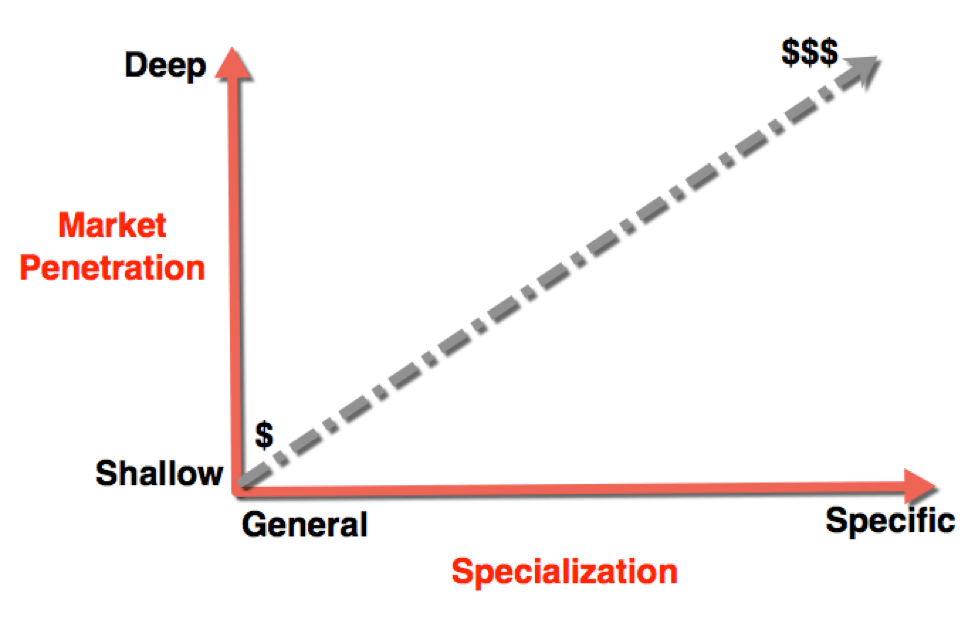Entrepreneurs – especially those successfully pulling in millions of dollars a year – wouldn’t you agree that the idea of discussing “niches” sounds a little, shall we say, elementary?
If you said “yes” – you’re not alone.
In fact, years ago, I would have thought the exact same thing…
However, you may be surprised that the lack of a niche – or worded another way, serving a more generalized market – is one of the most common ways business owners get “stuck.”
…And it doesn’t matter if you’re a startup or a multimillion dollar business.
I had a Platinum Business Coaching student who is a very successful internet marketer, bringing in several million dollars a year. She hired me to help grow her business to an 8-figure empire. Now, without going into too much detail, I’ll tell you this: when she started her business, she was very narrowly focused, and with a targeted approach, she took her business from startup to 7 figures in less than 5 years.
You’d think that by this point, she would have figured it out… But each time she grew, rather than expanding vertically with more ways to help her existing clients get closer to the ultimate result they were after, she expanded her market horizontally and broadened her market.

She became so successful, she forgot how she became successful in the first place.
She lost focus.
You see, each time she tried to expand her business and help another segment of buyers, she widened her market. As a result, she found herself working harder for less money…
And the proof? 95% of her customers only ever purchased one product from her because they couldn’t see how the other products tied in with their original purchase.
Her approach was similar to a brain surgeon saying:
“Portions of my clients have unhealthy brains because they are fat. Therefore, I will create a diet program to help them eat better – so they loose weight which will eventually help their brain. Oh, and because some of my clients also have unhealthy brains due to smoking, I’ll create a program to help them quit smoking.”
She widened her market (becoming more generalized), rather then going deeper with her existing products and services.
Now, chances are you’ve heard the old saying: “the riches are in the niches.”
This is typically followed up by some guy giving you the example of doctors and asking: “Who makes more money, a general practitioner or a brain surgeon?”
The answer is obvious, right?
Sure. According to Recruiter.com, in 2015, the average general practitioner in the United States made $176,400 – compared to the average brain surgeon, who brought in $540,029.
Specialists make 3 times more money than the generalists.
Many small accountants feel that everybody needs to get their taxes done, so they market to everyone – and are inefficiently investing their marketing dollars and efforts trying to reach a broad market.
Then there are accountants that have specialties (such as accounting for construction businesses, financial services, farmers, professional services, law firms, not-for-profits, etc.).
When I owned a multimillion dollar real estate development business, I used a specialized accountant because he specialized in construction. I assumed that he knew more about the industry than the “other guy” who claimed to know everything about every industry – and I happily paid the specialist over 4 times what I had previously paid the “one size fits all” accountant.
Accountants are not alone in this.
If you want to get paid more, specialize.
Look around you right now. We’ve entered the age where specialization is rewarded and generalization is commoditized.
Specialization has replaced generalization as a selling strategy.
Heck, when I was a kid, we had about a dozen television stations… Now there are hundreds! You’ve got a reality TV station, home improvement, history, military, etc.
You’ve got PetCo (who just sells pet products), Staples (office products), and Home Depot (building products).
Chris Anderson (author of “The Long Tail”) argues that every year there are fewer mass market hits, and a growing trend among niche films, books, and bands. The same thing applies in business!
Of the top 100 professional service firms in America, the majority specializes in serving a particular service or market. General market practitioners are in a decline! (Source: http://www.ignitiongroup.com/propulsion-blog-post/your-place-in-the-age-of-specialization/)
Tim Williams, Founder of Ignition Consulting Group (an agency devoted to helping advertising agencies create and capture more value) says:
“If you want your clients to value you more, become more valuable. Choose an area of focus that allows you to be paid for what you know, not just what you do; your head, not just your hands. In the sea of sameness, be a lighthouse.”
Consumer behavior demonstrates that people generally believe a SPECIALIST knows more about a particular subject than a GENERALIST. Therefore, we will happily pay more for specialized services.
You create a strategic advantage by being an inch wide and a mile deep – rather than a mile wide and an inch deep.

Metaphorically, think of a sheet of ice. The thicker the ice, the more strength it has…
The more ways you serve your clients by going deep with your product offering, the more strength you have in your business.
Specializing creates an aura of superiority that immediately differentiates you and your company from all the other run-of-the-mill competitors. You position yourself as an authority.
Another coaching client of mine earns 8 figures a year, and is recognized as one of Inc.’s 500 fastest growing companies. We’re working on a plan to take this company to $50 million within 5 years.
In doing so, I spoke with one of his ideal clients (who, individually, could contribute $100,000 a month to my client). They said that the most enticing factor of my client’s business is his focus on a specific need.
You see, when you go too wide and generalize yourself, you lose your identity and your potency as an expert. You get stuck because your prospects begin to wonder: who are you? What are you really an expert in?
When this happens, you no longer become the obvious choice. Instead, you’re forced to fight for positioning and each sale.
If you’re too general, people get confused about what makes you the best.
Write this down: the key to finding riches in the niches is to solve a specialized problem to a very specific market.
A niche is a big part of positioning yourself as the obvious choice.
Note the differences between a niche market and a target market.
A target market is the group of people you promote your products and services to
A niche market is the specialized problem you’re solving for your target market.
I have a friend who’s the top electrician on the seacoast. He rose to market dominance – but not because he was the best marketer or the had the best electrical skills in the business (though, I’d argue he likely does).
His rise was due to the fact that his market had a specialized problem, and he was the first one to strategically position his business as the only one to specialize in fixing it.
You see, the seacoast (where Nate owns his business) is largely composed of your typical old New England homes… Many dating as far back as the 1700s and 1800s. His competitors market themselves as specializing in new/existing homes, additions, renovations, and new construction.
Now, let’s face it: electricity is electricity. For the most part, any certified electrician can adequately complete just about any job. And while that’s true, it’s not perceived as equal to all people – especially those who don’t understand electricity.
So, when Nate started his electrical company, he made one big, bold statement to capture his niche: “Specializing in Old Homes.”
This simple, 4-word sentence instantly positioned him as the leading electrician and authority for electrical service on old homes. No one else made this claim. Sure, some people consider a home built 20 years ago to be “old,” while others looked at a home built in 1798 as old. It didn’t matter – people called Nate in droves.
As expected, competitors copied Nate’s positioning – but he was the first, and made everyone else work twice is hard, trying to dethrone the king of the mountain.
Write this down: people don’t buy products/services – they buy solutions to their problem.
In other words, they’re not hiring Nate as an electrician. They’re hiring Nate because they have a perceived problem related to their old home.
You don’t hire a carpet cleaner – you get someone to clean your carpets because your dogs soiled them.
You don’t hire a business coach – you find someone who can help you get your business “unstuck.”
You don’t buy a TV – you want a unit you can use to entertain your friends while watching a big game.
You don’t buy a Mercedes – you want a car that says you’re successful.
Are you following me?
You need a starting point that’s very focused and narrow… Then, once you’ve earned their trust and dominated your market by going an inch wide and a mile deep, you can begin to expand to others one inch at a time.
Note that Nate didn’t widen his niche by saying: “Well, since I’m here and I already know how to swing a hammer, I might as well advertise myself as doing construction as well.”
Dan Kennedy says you want to…
“Compete in a market of one.”
The authors of the best selling book “Blue Ocean Strategy” say that you want to strive to create an uncontested market space while making the competition irrelevant.
Nate did that. By being the only electrician who specialized in old homes, he dominated his market.
What’s it going to take to position you as the obvious choice?
Keep in mind, these questions are focused on maximizing profit for existing business owners (not startups). And to giving credit where credit is due, many of these questions are inspired by Dan Sullivan’s “Master D.O.S. Analysis.”
Begin by answering these questions:
1 – Who are your 5 best customers?
Example:
- ACME, Inc.
- XYZ, LLC
- ABC Corp.
- Santa Clause & Co.
- Frosty & Associates
2 – What are the common characteristics of each customer?
Example:
- Existing business owners (3+ Years)
- Business isn’t growing fast enough
- Revenue around $10 million
- Focused on winter revenue sources
- Parent of school-aged children
- Challenges with seasonality
3 – What are their biggest fears, worries, and concerns that need to be eliminated?
Example:
- Not enough business in summer months
- Competition increasing
- Downward price pressures due to Chinese manufacturing
- Don’t know what marketing is working
- People not believing in the spirit of Christmas
4 – What opportunities exist for your customers once their fears, worries, and concerns have been eliminated?
Example:
- Steady, predictable, and reliable income
- Reinvestment into new technological innovations
- Improved market share
- Create higher quality toys that last longer and provide happier customers
- Higher ROI with marketing efforts
5 – What strengths exist with your customers to realize these opportunities?
Example:
- Under-utilized database of prospects
- Children truly want to believe in the spirit of Christmas
- Joint ventures with other businesses should be easy
- Long history of success and endorsements from people of influence
- There are many giving opportunities throughout the that can be capitalized on
- Communication with prospects is welcomed
- Elves make great sales people (just need training)
- Leadership maintains great vision
6 – What are 3 specific problems you solve that eliminate these dangers, capitalize on these opportunities, and maximize their strengths?
Example:
- Reduce seasonality
- Increase marketing ROI
- Position as obvious choice among those who can afford it
7 – What’s the ultimate result your customers experience when working with you?
Example:
- Predictable and reliable profits
8 – Create your Core Value Statement (your target market)
I work with existing business owners that sell winter-related products/service to parents {IDEAL CLIENT} by specifically helping them to reduce seasonality, increase marketing ROI, and eliminate price comparison {3 PROBLEMS YOU SOLVE} so they can enjoy more predictable and reliable profits {BIG VALUE STATEMENT}.
Now that you answered your Core Value Statement, you have your target market.
Look at your Core Value Statement and ask yourself:
“What can I offer my customers or clients that will give them a greater value, advantage, benefit, or experience to help them achieve the ultimate result they are after?”
Look at your business – the products/services you offer – and think about these questions:
Are you working inside of your Core Value Statement?
What markets, products, or services need to be eliminated in order to create sniper-like, precision focus on driving core value to your target market?
This will get you one step closer to getting you “unstuck” and positioning you as the obvious choice in your market.
